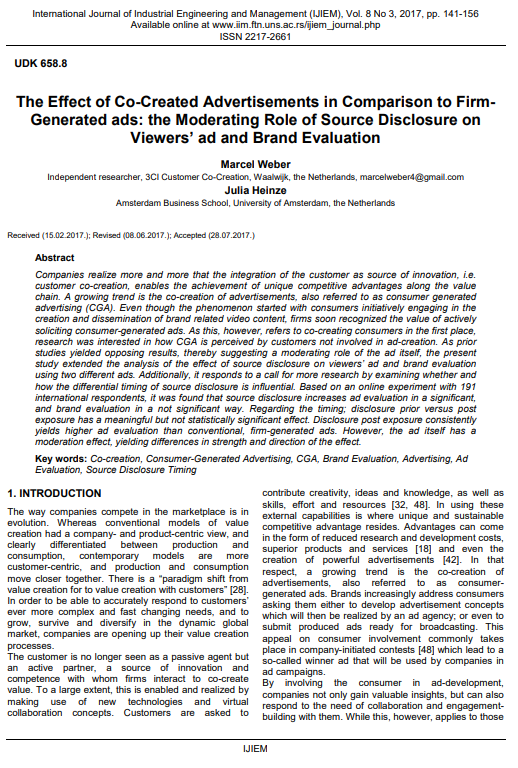The Effect of Co-Created Advertisements in Comparison to Firm-Generated Ads: the Moderating Role of Source Disclosure on Viewers’ ad and Brand Evaluation

Published 2017-09-30
abstract views: 251 // FULL TEXT ARTICLE (PDF): 0
Keywords
- Co-creation,
- Consumer-Generated Advertising,
- CGA,
- Brand Evaluation,
- Advertising
- Ad Evaluation,
- Source Disclosure Timing ...More
How to Cite
Copyright (c) 2023 International Journal of Industrial Engineering and Management

This work is licensed under a Creative Commons Attribution 4.0 International License.
Abstract
Companies realize more and more that the integration of the customer as source of innovation, i.e. customer co-creation, enables the achievement of unique competitive advantages along the value chain. A growing trend is the co-creation of advertisements, also referred to as consumer generated advertising (CGA). Even though the phenomenon started with consumers initiatively engaging in the creation and dissemination of brand related video content, firms soon recognized the value of activelysoliciting consumer-generated ads. As this, however, refers to co-creating consumers in the first place, research was interested in how CGA is perceived by customers not involved in ad-creation. As prior studies yielded opposing results, thereby suggesting a moderating role of the ad itself, the present study extended the analysis of the effect of source disclosure on viewers’ ad and brand evaluation using two different ads. Additionally, it responds to a call for more research by examining whether and how the differential timing of source disclosure is influential. Based on an online experiment with 191 international respondents, it was found that source disclosure increases ad evaluation in a significant, and brand evaluation in a not significant way. Regarding the timing; disclosure prior versus post exposure has a meaningful but not statistically significant effect. Disclosure post exposure consistently yields higher ad evaluation than conventional, firm-generated ads. However, the ad itself has a moderation effect, yielding differences in strength and direction of the effect.
Article history: Received (15.02.2017); Revised (08.06.2017); Accepted (28.07.2017)

